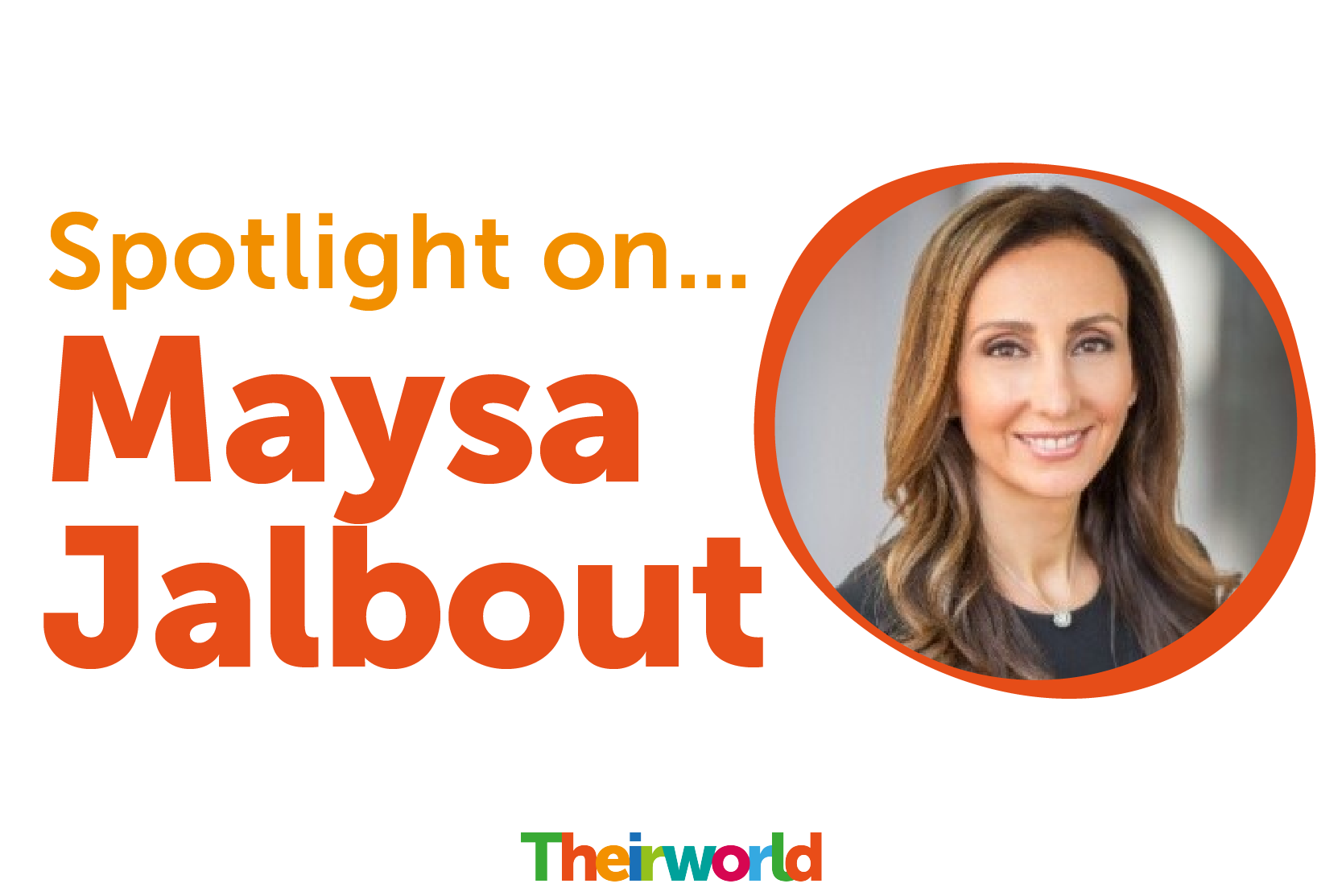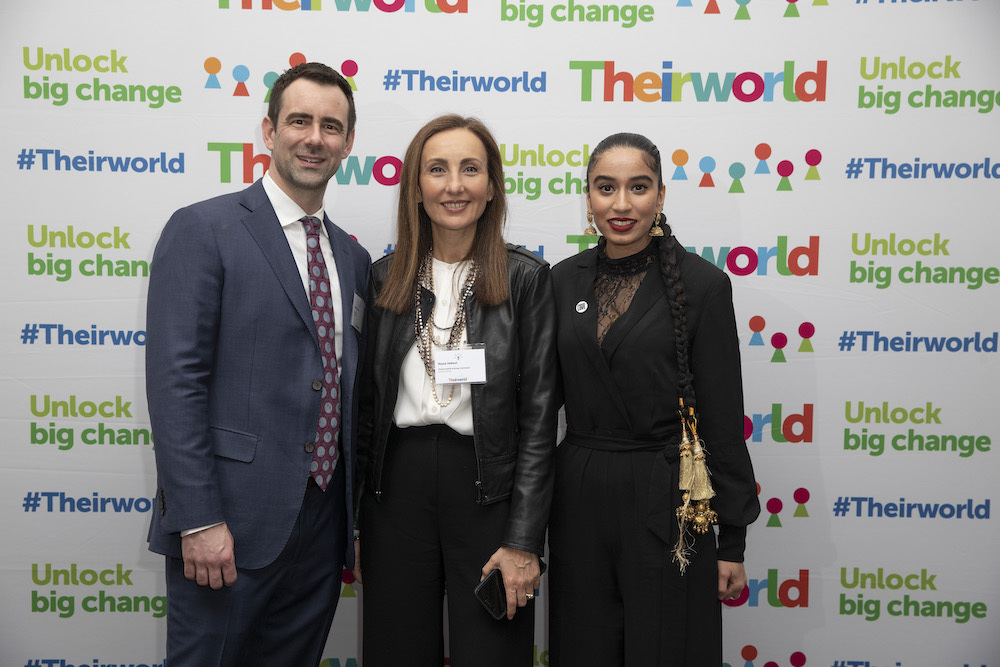
“Early childhood education plays a powerful role in addressing the psychosocial needs of traumatised refugee children”

Early childhood development, Spotlight On ...
Conflict and displacement can have a hugely adverse effect on the development of a young child’s brain. But early interventions – including early childhood education (ECE) – help to protect them from the most severe consequences of stress and trauma.
To highlight the challenges and opportunities for supporting ECE in crisis contexts, Theirworld, the Inter-Agency Network for Education in Emergencies and the Moving Minds Alliance will host a webinar on Monday, October 4.
It will feature Maysa Jalbout, a highly-respected figure in international development, education and philanthropy. She is a non-resident fellow at the Center for Universal Education at Brookings and has worked with Theirworld to highlight the challenges and solutions for refugee education.
At the webinar, Maysa will present key findings and recommendations from a report she co-authored for Theirworld, titled Ensuring Quality Early Childhood Education for Refugee Children: A New Approach to Teacher Professional Development.
In the latest in our Spotlight On … series, which features inspiring people from the world of education, we spoke to Maysa about her work with Theirworld and the importance of early childhood education for refugee children. You can register for the webinar here.
Can you briefly describe who you are and what is your relationship with Theirworld?
Advocating for access to education for the most vulnerable children and youth, especially refugees, is my life’s work. Over the past decade, I have had the privilege to collaborate with Theirworld on some of the most world’s pressing education needs.
Theirworld first commissioned me to support its early efforts to find solutions for the Syrian refugee education crisis. I found its work was critical to the success of the international partnership and, in particular, the strategy to double-shift public schools to make it possible for refugee children to access education in Lebanon.
Since then, I have had the opportunity to work with Theirworld on many other projects in the Middle East, Europe and beyond.
Tell us about the webinar at which you are presenting on refugee early childhood education.
The objective is to share three recent studies that underscore the powerful role early childhood development, including early childhood education, can play in mitigating and protecting against the most harmful impacts of compounding adversity.
Researchers from the University of Virginia and Yale University will present their recent research on early childhood development (ECD) in emergencies. I will present findings from Theirworld’s research on professional development for early childhood educators working with young refugee children and the opportunities for future action that emerged from this research.
We hope the event will catalyse greater interest in support for ECD in emergencies and particularly hope that Theirworld’s findings will resonate.

Maysa Jalbout (centre) with Theirworld President Justin van Fleet and Global Youth Ambassador Amrit Kaur Lohia at our 2020 International Women’s Day event (Theirworld / Heathcliff O’Malley)
Why is prioritising ECE in emergencies important to you and what specific actions do governments and donors need to take?
Governments and donors have long been aware that ECE is one of the most effective investments in the future of children and nations. Good-quality ECE helps ensure children develop the foundation for their future development, maximising their capacity to learn and develop cognitive and emotional skills.
Yet ECE is one of the least-funded education sub-sectors globally, especially in emergencies. Only 1% of development aid for education in crisis-affected countries goes to pre-primary education.
Young refugee children and those affected by conflict are among the least likely to benefit from ECE. Yet our research shows that, in addition to the learning benefits, ECE for young children in refugee settings plays a powerful role in addressing their psychosocial needs – including helping them begin to heal from trauma.
Governments and donor agencies would be wise to prioritise ECE in emergencies. Over time, support to ECE would yield better learning outcomes and higher school retention, as well as other social and economic benefits for the family unit.
Your recent work for Theirworld has focused on supporting teachers who work with young refugee children. Why is that so important?
Throughout my field research with Theirworld, I’ve seen the tremendous role that teachers play and the huge expectations that are held for them. So much of the power and promise that education holds rests with teachers.
But in the field I’ve also seen many teachers feeling overwhelmed and under-supported. This has also been true for teachers in refugee settings, although it was never fully acknowledged. I am pleased with our decision to prioritise this in our research.
Our findings are aligned with all other levels of education; teachers make all the difference. The evidence is clear that sustained, nurturing relationships with adults can help limit and protect against the most severe effects of trauma on young children.
In providing those relationships, ECE teachers can be play deeply meaningful and impactful roles in young refugee children’s lives. But these teachers themselves need support.
Many have received only limited training, are working with limited resources and some may themselves be refugees and dealing with their own trauma from conflict and displacement. Providing more intensive support to teachers is essential to help them to fulfil the huge expectations we hold for them and to help teachers themselves feel respected.
What kind of support do teachers working with refugee students – in early childhood and beyond – most need? How can the international community respond to these needs?
Teachers require support that is relevant and tailored to their sociocultural context, personal and academic backgrounds, skill and experience level, as well as the needs and circumstances of the students they teach.
Support needs to be sustained over time and has to equip early childhood educators not just with activities or strategies to use in the classroom but also with an understanding of why those strategies work.
We would like to see teachers trained on the basics of children’s development, including how young children’s brains develop and how trauma impacts their growth in the early years.
Supporting teachers in refugee settings will require commitment from the international community to make ECE a bigger part of funding for crises. It will require pooled funding from the range of partners working in this area and thoughtfulness about innovations, like how technology is used.
As part of our research, we’ve proposed four avenues to strengthen support for ECE teachers and we invite any organisations who are interested in this work to be in touch.
I am energised by the determination of children (and their families) to obtain an education against all odds. Maysa Jalbout
How can the general public support ECE in emergencies?
We welcome the support of anyone who believes in the value of ECE in emergencies. You can:
- Learn as much as you can about the benefits of ECE. Read our report and join the webinar.
- Write a letter to your government representatives asking them to increase their funding.
- Make a donation to Theirworld to continue their advocacy for ECE in emergencies. Find out more about how Theirworld supports refugee education.
- Support education efforts for refugees in your community.
What achievements with Theirworld are you most proud of?
I appreciate all of the important work I have had the chance to carry out with Theirworld. I am especially proud of the impact the work has had and continues to have on the lives of hundreds of thousands of refugee children in Lebanon by ensuring they have access to education.
More recently, I am particularly grateful to Theirworld for facilitating an agreement between the European Union, Greece and United Nations agencies to enable refugee children on the Greek islands to begin to join national public schools.
Both of these projects had what seemed like insurmountable challenges at the beginning. But Theirworld and its partners broke through the deadlock with carefully-crafted solutions, ownership by host governments and support from the international community.
The education crisis is such a huge problem to solve. What keeps you motivated when the obstacles feel too big to overcome?
I have been working on contributing to solving global education inequity for over two decades. In that time, we have seen considerable progress in the number of children who are attending school.
Progress, however, has been uneven. While some countries are now able to focus on the quality of education they are providing, many countries still lack the resources to make education accessible to all children.
Far too many girls are still unable to access or continue their schooling because of gender barriers. And, unfortunately, the vast majority of out-of-school children are affected by emergencies.
While I am sometimes frustrated by the slow pace of progress and the less than adequate funding for education, I am more often energised by the determination of children (and their families) to obtain an education against all odds.
More news

